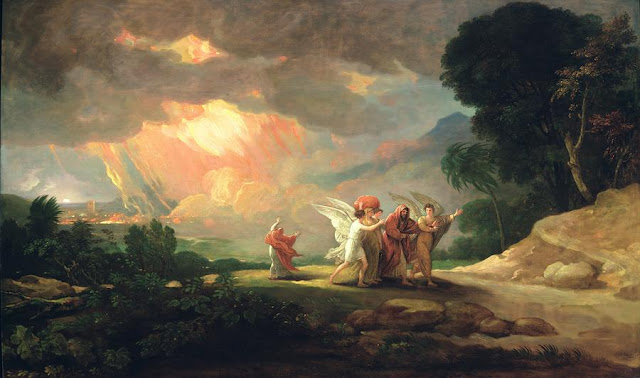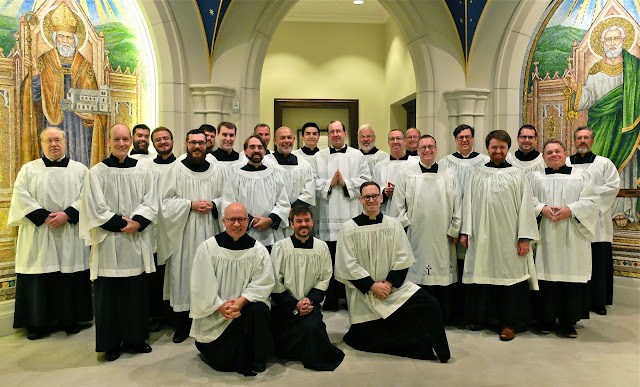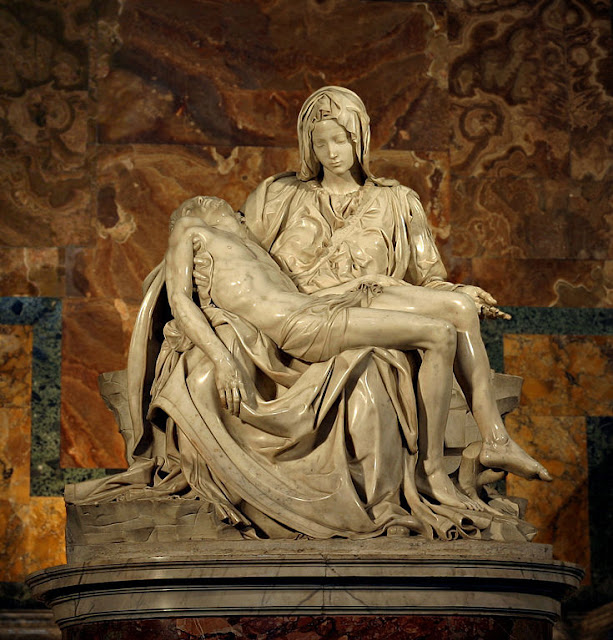Fleeing Sodom: the Procession to the Sanctuary

Fuga mundi - flee the world - is the cry of the prophet bidding us to venture out to meet the Lord.
John the Baptist said (St John 1:23):
I am the voice of one crying in the wilderness, ‘Make straight the way of the Lord,’ as the prophet Isaiah said.
Architecture
We enter the inner precincts of a Catholic Church. A centrally located tabernacle wherein the Eucharistic Lord is reserved, on an ad orientem altar, places the Lord at the center of our attention. We have fled the cacophony of the workaday world to dwell in the serenity of the house of the Lord.
This Advent, we flee Sodom.
And the two angels came to Sodom in the evening, and Lot was sitting in the gate of the city. And seeing them, he rose up and went to meet them: and worshipped prostrate to the ground. [...]And when it was morning, the angels pressed him, saying: Arise, take thy wife, and the two daughters which thou hast: lest thou also perish in the wickedness of the city. [...]The sun was risen upon the earth, and Lot entered into Segor. And the Lord rained upon Sodom and Gomorrha brimstone and fire from the Lord out of heaven. And he destroyed these cities, and all the country about, all the inhabitants of the cities, and all things that spring from the earth. And his wife looking behind her, was turned into a statue of salt. And Abraham got up early in the morning and in the place where he had stood before with the Lord(. ...) He looked towards Sodom and Gomorrah, and the whole land of that country: and he saw the ashes rise up from the earth as the smoke of a furnace. Now when God destroyed the cities of that country, remembering Abraham, he delivered Lot out of the destruction of the cities wherein he had dwelt. - Genesis 19
The world is rife with distractions that can easily impose themselves upon us. Viruses weaken the moral and spiritual health of those infected, entrenching themselves in their hosts, obscuring perception, weakening conscience, and metastasizing into destructive habits. Willful deviations from God's design become routine: aberrant and abhorrent behaviours; identity politics that enable adherents to demean and persecute others to the point of destroying livelihoods; and the corruption saturating social and education institutions pits children against their parents and robs kids of their innocence. The tsunami of injustices is enough to vex saints and drive parents to despair.
And now, O Lord, I have turned my eyes and my face toward thee. - Tobit 3:12
Regular Mass goers know the importance to the soul of partnering with Jesus in the Sacrament of Penance. To dispose themselves to the will of God, so that they may hear His voice speaking in and shaping their hearts. Spiritual deafness is the result of a weak commitment on our part, and our tendency to adopt comfortable platitudes gleaned from feel good homilies that, for all their similarity to spiritual vitamins, do little to inspire a conversion of heart, foster a reordering of priorities nor effect a heartfelt orientation to the true, the good and the beautiful.
We must be mindful that the Cross of Jesus Christ is the lens through which we must view and test each experience, lest we assume God is speaking when the contrary might be true. That is, some lesser god might be vying for our attention, our affections, and our souls. Those operating the Synod on Synodality must necessarily be mindful of the absolute need for rigorous discernment, rooted in authentic prayer, whilst parsing the input being received. And, if not attentive, they need to be reminded in no uncertain terms that there can be no bartering away God's revelation in Christ Jesus. The Holy Gospel is God's law.
The Christian ideal has not been tried and found wanting. It has been found difficult; and left untried. - G.K. Chesterton, What's Wrong with the World
Stipes & Patibulum
Our path forward begins at the foot of the cross at the entrance to the church and proceeds up the stipes or vertical member of the cross, up the nave of the Church, toward the transept, Jesus' outstretched arms beckoning us to His mercy, the patibulum of the cross, where the procession slows. Then, with appropriate disposition, the sacred parade enters the sanctuary, stretches outwards and expands into the sanctuary of Jesus' heart.
2 Timothy 2:11-13
The saying is sure:If we have died with him, we shall also live with him;if we endure, we shall also reign with him;if we deny him, he also will deny us;if we are faithless, he remains faithful—for he cannot deny himself.
We follow the entrance procession accompanied by the entrance hymn to the Introit in the sanctuary, the holy of holies, where the priest acting in the person of the Eternal High Priest, Jesus Christ, collects our prayers to be gathered up into the prayer of Jesus to the Father. The Holy Spirit takes us up into Jesus' prayer.
Now the point in what we are saying is this: we have such a high priest, one who is seated at the right hand of the throne of the Majesty in heaven, a minister in the sanctuary and the true tent[a] which is set up not by man but by the Lord. For every high priest is appointed to offer gifts and sacrifices; hence it is necessary for this priest also to have something to offer. Now if he were on earth, he would not be a priest at all, since there are priests who offer gifts according to the law. They serve a copy and shadow of the heavenly sanctuary; for when Moses was about to erect the tent, he was instructed by God, saying, “See that you make everything according to the pattern which was shown you on the mountain.” But as it is, Christ has obtained a ministry which is as much more excellent than the old as the covenant he mediates is better, since it is enacted on better promises. For if that first covenant had been faultless, there would have been no occasion for a second. - Hebrews 8: 1-7
Attached to the cross of the church, crucified in the nave as it were, is the Body of Christ, the baptized faithful. We are grafted on to the cross with Christ. We are grafted into the wounds of Jesus on the cross. We are welcomed into the wounds of the corpus, becoming the corpus by the grace of God. The wounds of Jesus make an opening in God for us to dwell. Our wounds open in us a place for God to dwell.
Iesus Nazarenus, Rex Iudaeorum
Above our Lord's head hung the titulus, on which was written in Hebrew, Latin and Greek, a testament to Jesus' identity, an identity ignored by those preoccupied with power and control, those enmeshed in sin. The Altar toward which we have journeyed is that very titulus, the altar of sacrifice, the identity of the crucified Lord, now risen and inviting us to let Him embrace us among His chosen.
The altar cross stands before us, drawing us up and into the mystery of the death and resurrection of Jesus. Do we abandon Jesus, or do we remain with His mother and the disciple he loved, those who stood with Him in His most vulnerable moment, His passion?
The crib of the Nativity rests in the shadow of the Cross. The Second Person of the Blessed Trinity, the Eternal Word, took on flesh. He - the Eternal Word - became vulnerable, an infant, for our salvation. Acquainted with the suffering Jesus, we can look back on the Nativity with an awe magnified through the lens of gratitude, our gratitude for God's gift of salvation in Jesus Christ. A tiny child, nurtured at the breast of His Immaculate Mother, will in three decades be the one through Whom all mankind will be redeemed. Our perception of eternity is enhanced by God's gift of grace.
Redemption is offered everyone. Not all, however, are eager to accept Jesus' invitation to newness of life. Grace is needed to remove the cataracts of pride and hurt and other wounds that impede hearts and minds from discovering the Way, the Truth and the Life.
The Advent Wreath, which brings to mind the crown of thorns, steps us through a progression toward the light Who is Jesus. Each candle lit each week illuminates the path forward, the procession toward the heart of the wreath, toward the heart of the One Who wore the crown of His passion and our liberation. One candle in particular offers worshippers a moment to attend to a simple, beautiful focus. The rose candle of Gaudete Sunday weens us from an expectation that another purple candle will be lit. The expectations we harbour in this life must yield to the hope Who is Jesus Christ.
Soon, in the Northern hemisphere at least, the natural light will return. Hope breaks through the darkness of sin.
.jpg)





Comments
Post a Comment
Your comments will be appreciated and posted if 1) they are on topic and 2) preserve decorum.
Stand by your word.